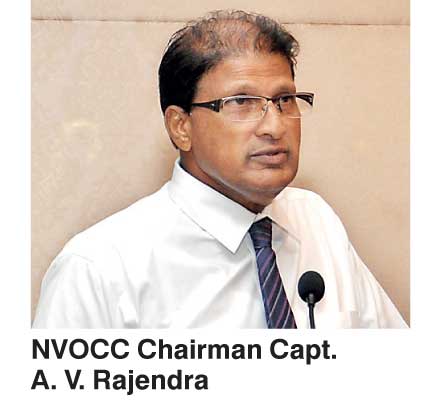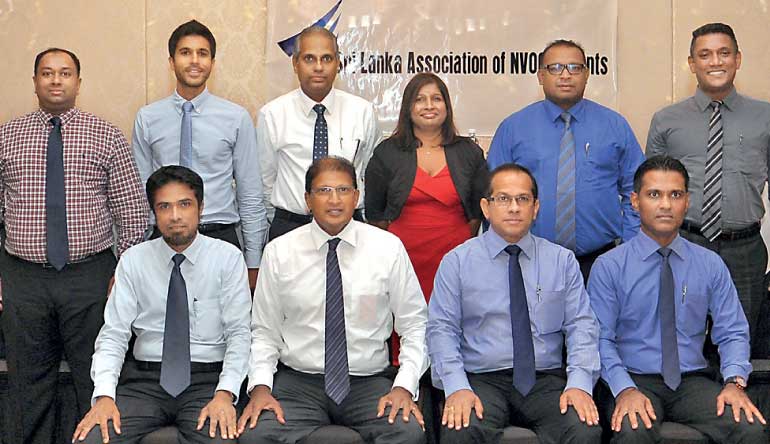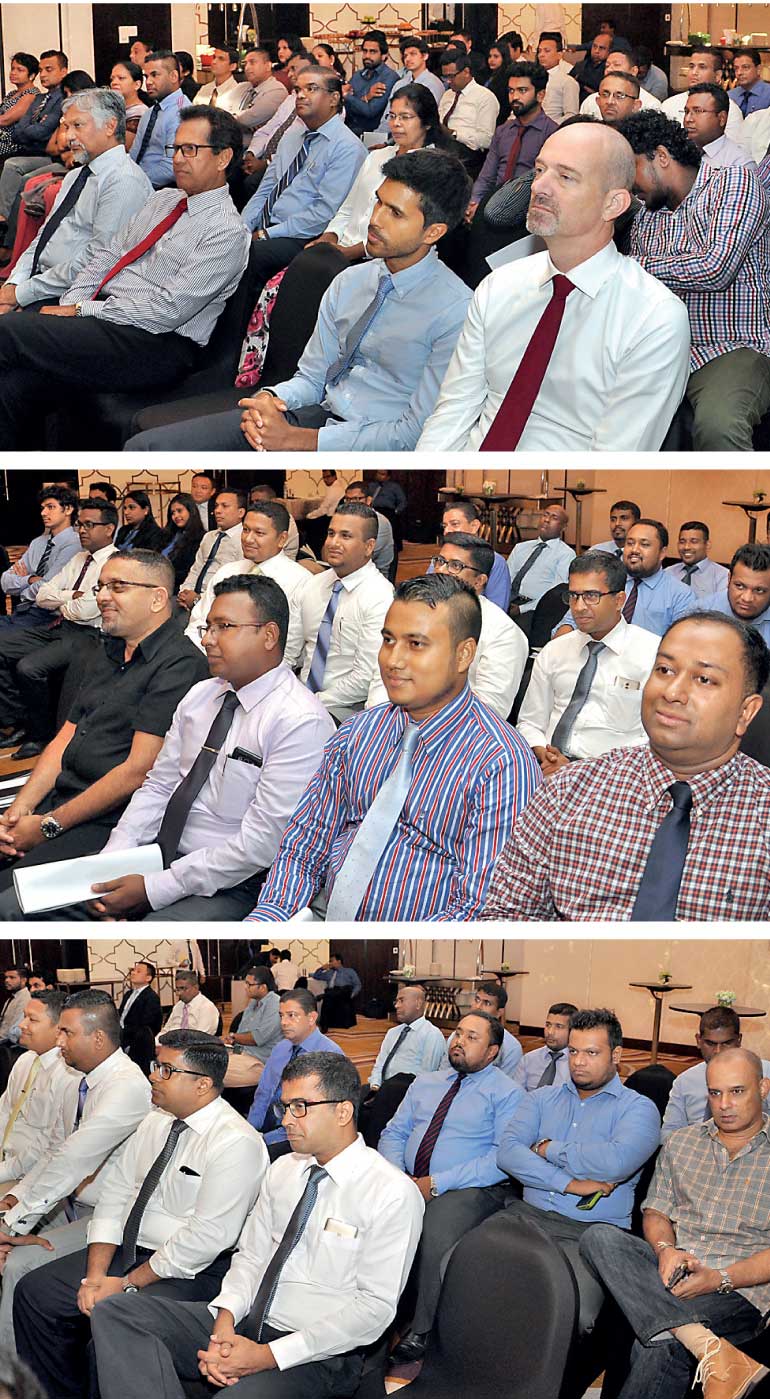Thursday Feb 19, 2026
Thursday Feb 19, 2026
Monday, 29 May 2017 00:02 - - {{hitsCtrl.values.hits}}
 From left: Sri Lanka Association of NVOCC Agents Vice Chairman Prasad Jinadasa, Sri Lanka Ports Authority Managing Director H.D.A. Premachandra, NVOCC Chairman Capt. A.V. Rajendra, Merchant Shipping Director General A.W. Seneviratne, NVOCC Treasurer Mohamed Thahir and NVOCC Secretary Minnaz Riyal
From left: Sri Lanka Association of NVOCC Agents Vice Chairman Prasad Jinadasa, Sri Lanka Ports Authority Managing Director H.D.A. Premachandra, NVOCC Chairman Capt. A.V. Rajendra, Merchant Shipping Director General A.W. Seneviratne, NVOCC Treasurer Mohamed Thahir and NVOCC Secretary Minnaz Riyal
 The newly-formed Sri Lanka Association of NVOCC Agents (SLANA) last week bemoaned the 2013 Gazette which prohibited collecting legitimate fees and charges such as Terminal Handling Charge (THC) from their customers for the services offered.
The newly-formed Sri Lanka Association of NVOCC Agents (SLANA) last week bemoaned the 2013 Gazette which prohibited collecting legitimate fees and charges such as Terminal Handling Charge (THC) from their customers for the services offered.
SLANA Chairman Capt. A.V. Rajendra, speaking at the association’s inaugural Annual General Meeting, spoke strongly against the 2013 gazette and its dangers. He also thanked former Ports and Shipping Minister Arjuna Ranatunga for making a decision to revisit what Capt. Rajendra described as “unfair regulations” and expressed the hope that new Minister Mahinda Samarasinghe would continue to do his best for all.
Following are excerpts of the SLANA Chairman’s speech at the AGM at which the Director General of Merchant Shipping Ajith Seneviratne and Sri Lanka Ports Authority Managing Director H.D. Premachandra were also present.
Non-vessel operating carriers and their agents have been engaged in doing businesses via the Port of Colombo for decades, contributing a considerable share of volume whilst offering services to regional ports and niche market and facilitating our exporters and importers.
The need for the formation of an association was due to several factors.
The NVOCC activities were often misunderstood by most officials in the state and the industry as freight forwarders or shipping agents. Because of this misconception, the issues faced by our membership were not understood and did not receive the desired attention of the state or other institutions. In light of this, the Sri Lanka Association of NVOCC Agents was formerly formed on 6 May 2016.
The Executive Committee of SLANA thereafter met with DG Shipping, the Minister of Ports and Shipping and the management of Sri Lanka Ports Authority and presented our views and facts highlighting the contribution made by the NVOCC agents to the ports and shipping industry and the issues faced by our membership.
I am pleased to inform you that the association’s presentations were recognised and well-accepted by the authorities and subsequent to our proposals, DG Shipping Secretariat is taking necessary steps to introduce a separate category for NVOCC agents in the Licensing of Shipping Agents Act giving due recognition to our membership. We are thankful to DG Shipping.
Whilst we laud the efforts taken by the Ministry of Ports and Shipping, the Sri Lanka Ports Authority and the Government to improve the productivity and the infrastructure development of the port towards making the Port of Colombo a maritime hub, the most recent burning issue for the NVOCCs and the other service providers are the constraints and restrictions imposed by the then Government upon the service providers in the year 2013, forcing and preventing the service providers from collecting legitimate fees and charges from their customers for the services offered.
 Seated from left: Office-bearers Vice Chairman Prasad Jinadasa, Chairman Capt. A.V. Rajendra, Treasurer Mohamed Thahir and Secretary Minnaz Riyal
Seated from left: Office-bearers Vice Chairman Prasad Jinadasa, Chairman Capt. A.V. Rajendra, Treasurer Mohamed Thahir and Secretary Minnaz Riyal
Standing from left: Executive Committee Harsha De Silva, Ana Senanayake, Nalin Abeysekara, Swabha Wickremasinghe, Tharanga Perera and Raj Rasiah
The regulation so imposed by way of gazette 1842/16 in the year 2013 was totally against the international norms and practices. Parties with vested interests pressed upon the previous Government to introduce such regulations, bypassing all ethical practices or discussions with the stakeholders in the industry which was detrimental to the logistics and service industry, the image of the country and against one’s fundamental rights.
Further, the Port of Colombo is now perceived by regional NVOCC operators as a negative port due to another grave factor, which is the prevention of the collection of terminal handling charges - a land-based cost, a direct cost arising from payment to port terminals for their services.
One should not forget the fact that the NVOCC is a vital arm of the service industry, which was a great source of strength and was supportive of the trade and Sri Lanka to export and import its goods from and to, during the period of sanctions and an embargo placed on Iran and Iraq.

Service providers to the shipping industry are facing difficult situations, the principals of shipping liners and NVOCC operators are running into losses and unfair regulations in Sri Lanka compound the situation.
We are thankful to the former Minister of Ports and Shipping Arjuna Ranatunga and the Director General of Shipping for inviting all stakeholders to revisit the unfair regulations announced via gazette notice 1842/16 in year 2013 to submit fresh proposals in order that a just solution may be found in the overall interest of our country, not just a select few.
We will also pursue this subject with our new Minister for Ports and Shipping and we are confident that the Hon. Mahinda Samarasinghe will continue to do his best for all.
Training is a part of our association’s program and the seminar we conducted on ‘An Analysis on Bill of Lading’ attracted a large number of participants. We will continue with such programs in the future as well.
Pix by Ruwan Walpola